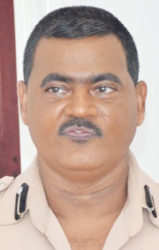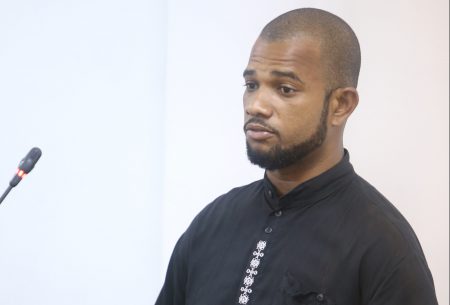Commissioner of Police Seelall Persaud’s ability to continue to act in his position has “become untenable” and he should be made to resign under terms considered appropriate by President David Granger, or if he fails to do so, be removed for misbehaviour, according to the final report of the Commission of Inquiry (CoI) into the police force’s handling of an alleged plot to kill the president.
Furthermore, the report, which was laid in the National Assembly yesterday, recommended that the officers that played a key role in the investigation be reassigned, possibly to positions outside of the Guyana Police Force (GPF) based on their conduct during the investigation. This includes Crime Chief Wendell Blanhum, Assistant Commissioner Clifton Hicken and acting Police Commissioner David Ramnarine, who the report stated “lack the professionalism to lead the Guyana Police Force.”
Although the report has been due to be discussed at Cabinet, there has been no word from the government on how it would treat the recommendations, which were leaked to the state newspaper in August. However, the findings are believed to be the reason for President Granger’s contentious directive to the Police Service Commission to stay its consideration of promotions. Blanhum and Hicken were among those recommended for promotion. Public Security Minister Khemraj Ramjattan has publicly stated that the government is happy with Blanhum’s performance, notwithstanding the criticisms of him in the report.

The CoI, conducted by retired Assistant Commissioner Paul Slowe, was set up to investigate the allegation made by complainant Andriff Gillard, who claimed that he was offered $7 million by businessman Nizam Khan to kill President Granger and the force’s handling of the probe.
Although the inquiry found that the allegations made by Gillard were “unsubstantiated,” and as a result “tenuous,” it was also concluded that the efforts made on the part of the police force were unsatisfactory.
According to the report, the conduct of the police in the matter “lacked the diligence that was required by a professional investigative body.”
It was further stated that the police’s response in the matter was influenced by the fact that Nizam Khan was the brother of Imran Khan, who had close ties with Persaud, and who also seemed to have influence over transfers and promotions within the force.

For this reason, the report said the failure by the GPF to not properly investigate the allegations was intentional.
Commenting on the actions taken by the senior officers during the course of the investigation, it concluded that Persaud, Ramnarine, Hicken and Blanhum lack professionalism, and recommended sanctions be taken against them. “…Serious consideration must be given to having all the main protagonists reassigned, even if that means placement outside the GPF, which the Commission strongly feels might be appropriate at this time…,” the report says.

“The GPF is too important a state agency to allow infantile squabbles, especially among senior members, to interfere with its operation. There is a clear indication that the main protagonists (Commissioner Persaud/Assistant Commissioners Ramnarine and Hicken/Senior Superintendent Blanhum) lack the professionalism to lead the GPF in this touted period of reform and transition,” it added.
There were no recommendations made in relation to action to be taken against Gillard, or the Khans.
‘Perjury’
The recommendation of Persaud’s removal was made on the grounds that he had interfered in the matter while on vacation leave and influenced the conduct of the investigations; acted improperly by instructing that Khan be sent on bail and bypassing the chain of command; failing to recuse himself from the matter although there was a conflict of interest; and failing to review the file on the matter.
It was also recommended that Persaud be investigated for perjury, as he had told the CoI that he first knew about the allegation after 4 pm on March 29, although Assistant Commissioner of Police Clifton Hicken, who was then ‘A’ Division Commander, claimed to have told him around 10 that morning.
It was also recommended that Assistant Commissioner Hicken be investigated for perjury for claiming under oath that he had reported the plot allegation to Commissioner Persaud at around 10 am on March 29, when the allegation was first made. Persaud did not back this story in his testimony before the CoI.
It was also recommended that Hicken be disciplined for neglecting to ensure that Gillard’s allegation was entered into the ‘A’ Division’s records; failing to interview Gillard when he was brought to his office; reporting to Commissioner Persaud while he was on leave (which the report called “prejudicial to good order or discipline”); and failing to report to acting Commissioner Ramnarine.
Ramnarine, it was stated, should be sanctioned for failing to view an electronic copy of the plot allegation before sending it off to the Crime Chief; and not ensuring that a proper investigation was conducted although he was second in charge and acted as Commissioner during the period.
He was also recommended for sanction for not initiating disciplinary action against Blanhum when he learnt that it was Persaud that had actually sent Khan on leave, contrary to what Blanhum had reportedly told him.
Superintendent Blanhum, the report said, should be disciplined for neglect of his duties by failing to supervise the investigation; lying to Ramnarine by claiming he had granted bail to Khan; failing to exercise due diligence in preparing the report, resulting in the report being sent off with the incorrect date the allegation was made being recorded; and being “insubordinate” and taking a “rude, argumentative and aggressive” stance at the CoI.
“His lack of supervision of this important investigation, his utterances, disrespect, and arrogance displayed before the Commission shows that he is incapable of functioning as the Crime Chief, the lead investigator and manager of the major investigating unit of the Guyana Police Force. Blanhum should be replaced as Crime Chief and reassigned in order to gain command experience,” the report said.
Referring to the fact that the Criminal Investigation Department (CID) has been publicly credited for its work in solving crimes since Blanhum took up the helm as Crime Chief, the report said, “…given his statement before the commission that he is a manager at the executive level of the Guyana Police Force and therefore does not have to ensure that crimes and allegations are recorded in the appropriate books at police stations and his hands off attitude to this investigation, one has to question whether the recent success by the CID in solving some serious crimes had anything to do with his leadership, which seems to be lacking.”
Further, the report said Superintendent Rishi Dass, who was then Deputy Crime Chief, should be disciplined for failing to ensure that a proper investigation was conducted, although he claimed to have observed that this was not being done, and for neglect of duty, for failing to ensure that the correct date was on the report submitted to the commissioner.
It was also recommended that he be replaced as Deputy Crime Chief and removed from the CID. Dass was granted a transfer to another department.
The report also recommended that Superintendent Mitchell Caesar be disciplined for neglect for failing to properly supervise the investigation and sanctioned for leaving while the investigation was underway without making a record of his movement.
Inspector Prem Narine, who was reportedly instructed by Persaud to send Khan on bail, was commended on his delivery before the commission, but it was recommended that he be reprimanded for reportedly failing to properly examine a bail receipt, which led to Khan being released without posting bail. It was stated elsewhere in the report that Narine said that a mistake was made by a rank at the Brickdam Police Station, who wrote the receipt in Nizam’s brother’s name (Imran Khan) instead.
It was further recommended that Komal Pitamber, the lead detective in the matter, be disciplined for failing to secure a search warrant before searching Nizam Khan’s house; failing to conduct a diligent search; and allowing Nizam to travel in his own vehicle to CID.
It was stated that he should be removed from the CID for his poor performance in the investigation.
Detective Corporal Germaine Laundry, it was suggested, should be disciplined for failing to inform the commission on his first appearance of the statement reportedly taken from a witness who challenged Gillard’s credibility, and should be removed from the CID for his poor performance during the investigation.
Concocted evidence
The report also suggests that the police were involved in fabricating evidence in the case.
The evidence in question related to that presented by the Commissioner Persaud, which the report said appeared false and intended to create the illusion that the police were diligent in their efforts. It also includes alleged witness testimonies that challenged the allegation made by complainant Gillard.
The report said that the attorneys representing the interests of the police were in possession of statements and other material that were not submitted to the commission initially, although a request for all relevant documentation had made. These were, however, later provided after a subsequent written request was made to the Commissioner of Police.
“Following this reminder, several documents were sent to the Commission, including an activity log, which purported to show the activities that were undertaken during the course of the investigation, and a copy of the recorded allegation made by Gillard,” it stated.
“The Commission is of the view that the activity log was a recent creation, falsely and belatedly concocted in an effort to create the impression that diligent efforts were made during the investigation,” it stated further.
While the findings state that the commission supports the view of the Police Legal Adviser and counsel that Gillard’s allegation was baseless for several reasons including the fact that his story was not corroborated by anyone, it was also acknowledged that there were questions about the credibility of the witnesses that testified against him.
The report found that Leon Baldeo and Luanna Walker, who both testified to the untruthfulness behind Gillard’s claim, were witnesses of convenience, and were procured by either Nizam Khan, his associates, or the police, to discredit Gillard.
Baldeo had testified that days before Gillard would go to the police himself to report the matter, he offered Baldeo $50,000 to go to the authorities and tell them that he had been present when Nizam offered Gillard money to kill the president.
Baldeo claimed that after he learnt that Nizam had been locked up, he went to the CID and related to the police what had happened between him and Gillard.
Walker, on the other hand, had told the commission that in an earlier conversation with Gillard, he had expressed intentions to have Nizam arrested, and so when she saw the news reports, she knew that he was lying.
It was pointed out in the report, however, that when the police officer that had reportedly taken the statement from Walker testified during his first appearance before the commission, he had made no mention of such an occurrence, although the report was supposedly taken only a few days prior, leading the commission to believe that the statement was concocted after the fact.
The officer, Laundry, when he testified again, could not explain why he had not given the information on the first occasion.
“The Commission is of the view that Laundry was being untruthful when he stated that the statement was taken from Walker on July 19. It would appear that after Walker was procured to give the statement Laundry was instructed to take same, and wanting to convey the impression that the statement was taken from Walker at an earlier date, recorded that date as July 19, forgetting that he had given evidence on July 21 and therefore would have been expected to mention that statement,” the report said.
The report also made reference to the role played by Caesar, who is in charge of the Major Crime Investigations Unit, which spearheaded the investigations into the matter.
It was related that Caesar had made reference to a witness coming forward to discredit Gillard’s testimony, but said that it was only later learnt that this witness was Walker.
“It transpired that Walker is alleged to have “come forward” and gave a statement to the police on July 19, the said statement was taken by Laundry. The Commission found it strange that Caesar on July 24, (the day when he gave his evidence) did not have the details of that statement, which was allegedly given to the police on July 19, five days before he appeared before the Commission,” it was stated.
In the findings, Walker’s testimony was called a “clear concoction” and one that “lacked credibility.”
Additionally, it was said that the third witness, Lloyd Adams, who claimed to have seen news reports about the allegation, and to have called Gillard, who then related to him that the allegation was not true, had not been completely truthful in his testimony.






